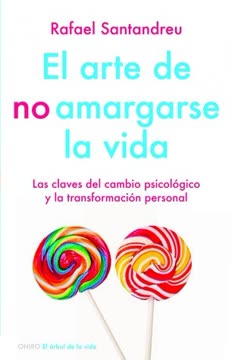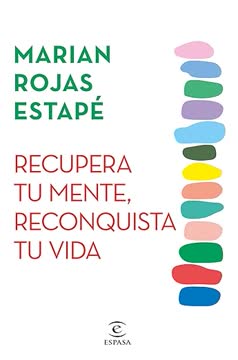Puntos clave
1. Happiness is a choice: Learn to interpret reality positively
Happiness doesn't lie in what happens to us, but in how we interpret what happens to us.
Perception shapes reality. Our interpretation of events, rather than the events themselves, determines our happiness. This concept, rooted in cognitive psychology, suggests that by changing our thought patterns, we can significantly impact our emotional well-being.
Practical steps for positive interpretation:
- Practice gratitude daily
- Look for silver linings in difficult situations
- Challenge negative self-talk
- Focus on what you can control
- Cultivate a growth mindset
By consciously choosing to view life's challenges as opportunities for growth and learning, we can increase our resilience and overall life satisfaction. This doesn't mean ignoring problems, but rather approaching them with a constructive mindset that promotes problem-solving and personal development.
2. Cortisol: The stress hormone that impacts health and happiness
When cortisol levels are chronically elevated, it begins to act as a toxin.
Understanding cortisol is crucial for managing stress and maintaining overall health. Cortisol, often called the "stress hormone," plays a vital role in our body's fight-or-flight response. However, when chronically elevated due to persistent stress, it can lead to numerous health issues.
Effects of chronic high cortisol:
- Weakened immune system
- Increased inflammation
- Disrupted sleep patterns
- Weight gain
- Mood disorders
To combat excessive cortisol production, focus on stress-reduction techniques such as deep breathing, regular exercise, and maintaining a consistent sleep schedule. Additionally, cultivating positive relationships and engaging in enjoyable activities can help regulate cortisol levels and promote overall well-being.
3. Overcome past wounds and future anxieties to live in the present
Fear always disposes us to see things as worse than they are.
Healing past traumas and managing future anxieties are essential for living fully in the present moment. Many people find themselves trapped in cycles of rumination about past events or worry about potential future outcomes, preventing them from experiencing the richness of the present.
Strategies for overcoming past and future fixations:
- Practice forgiveness (of others and yourself)
- Engage in cognitive restructuring to challenge anxious thoughts
- Use mindfulness techniques to ground yourself in the present
- Seek professional help for processing traumatic experiences
- Set realistic, achievable goals to create a sense of purpose and direction
By addressing both past wounds and future anxieties, individuals can free themselves to engage more fully with their current experiences, relationships, and opportunities for growth.
4. Express emotions healthily to avoid psychosomatic illnesses
When an emotion is expressed, the body responds. When an emotion is negated or repressed, it remains trapped, seriously damaging the individual.
Emotional expression is vital for maintaining both mental and physical health. Suppressing or denying emotions can lead to various psychosomatic illnesses, where psychological distress manifests as physical symptoms.
Common psychosomatic symptoms of repressed emotions:
- Chronic headaches
- Gastrointestinal issues
- Muscle tension and pain
- Skin problems
- Fatigue and sleep disturbances
To promote emotional well-being and prevent psychosomatic illnesses, practice healthy emotional expression through:
- Journaling
- Talking with trusted friends or a therapist
- Engaging in creative outlets like art or music
- Regular exercise to release emotional tension
- Mindfulness meditation to increase emotional awareness
By acknowledging and expressing emotions in constructive ways, individuals can reduce their risk of developing stress-related physical ailments and improve their overall quality of life.
5. Manage toxic people and cultivate positive relationships
A toxic person becomes a spectator of your life, with the right to offer an opinion at any time.
Identifying and managing toxic relationships is crucial for maintaining emotional well-being and personal growth. Toxic individuals often drain energy, criticize excessively, and undermine self-esteem, leading to increased stress and decreased happiness.
Strategies for managing toxic relationships:
- Set clear boundaries
- Limit exposure when possible
- Practice assertive communication
- Focus on self-care and personal growth
- Seek support from positive relationships
Simultaneously, cultivating positive relationships is essential for happiness and resilience. Surround yourself with "human vitamins" – people who uplift, support, and inspire you. These relationships provide emotional nourishment, encourage personal growth, and act as a buffer against life's challenges.
6. Practice mindfulness and exercise to reduce stress
Knowing how to look is knowing how to love.
Mindfulness and exercise are powerful tools for reducing stress, improving mental clarity, and enhancing overall well-being. Mindfulness, the practice of present-moment awareness without judgment, helps break the cycle of rumination and worry that often contributes to stress and anxiety.
Benefits of mindfulness:
- Reduced stress and anxiety
- Improved focus and concentration
- Enhanced emotional regulation
- Better sleep quality
- Increased self-awareness
Regular exercise complements mindfulness by:
- Releasing endorphins, natural mood-boosters
- Reducing cortisol levels
- Improving sleep quality
- Boosting self-esteem and confidence
- Providing a healthy outlet for stress and tension
Incorporating both mindfulness and exercise into daily routines can significantly improve mental and physical health, leading to greater resilience and life satisfaction.
7. Develop your Best Possible Self (BPS) through self-knowledge and passion
Talent + Passion = Vocation
Understanding and developing your Best Possible Self (BPS) is a powerful approach to personal growth and fulfillment. This concept involves identifying your strengths, passions, and values to create a vision of your ideal future self.
Steps to develop your BPS:
- Self-reflection: Identify your core values, strengths, and interests
- Visualization: Imagine your ideal future self in detail
- Goal-setting: Create specific, actionable goals aligned with your BPS vision
- Skill development: Continuously learn and improve in areas relevant to your BPS
- Regular review: Periodically assess and adjust your BPS vision and goals
By focusing on developing your unique talents and passions, you can create a sense of purpose and direction in life. This approach not only leads to greater personal satisfaction but also increases the likelihood of professional success and meaningful contributions to society.
Última actualización:
FAQ
What's How to Make Good Things Happen about?
- Focus on Happiness: The book explores the concept of happiness, linking it to self-esteem, love, and overcoming suffering. It emphasizes that happiness is an experience rather than a defined state.
- Understanding the Brain: It delves into neuroscience, explaining how thoughts and emotions impact physical health and well-being. The author simplifies complex brain functions to enhance readers' lives.
- Practical Tools: Offers practical advice for managing emotions, reducing cortisol, and fostering resilience. Encourages finding one's "Best Possible Self" through self-awareness and emotional management.
Why should I read How to Make Good Things Happen?
- Expert Insights: Written by psychiatrist Marian Rojas Estapé, the book combines scientific research with personal anecdotes, providing a credible perspective on mental health.
- Holistic Approach: Addresses both psychological and physiological aspects of happiness, integrating neuroscience with practical life advice for comprehensive mental well-being.
- Empowerment: Encourages readers to take control of their happiness by understanding their emotions and thoughts, promoting a proactive approach to mental health.
What are the key takeaways of How to Make Good Things Happen?
- Happiness is a Journey: Emphasizes that happiness is a continuous journey involving self-discovery and emotional growth, not a final destination.
- Cortisol Management: Highlights the importance of understanding cortisol's role in stress and health, offering strategies like exercise and mindfulness to lower levels.
- Resilience and Love: Presents love as a powerful antidote to suffering, advocating for building resilience through love and compassion.
What are the best quotes from How to Make Good Things Happen and what do they mean?
- "Happiness consists in having a fully realized life.": Suggests that happiness is about living authentically and aligning actions with personal values and aspirations.
- "Suffering has meaning.": Encourages finding purpose in challenges and hardships, viewing them as opportunities for personal growth.
- "We have to go out and find it.": Emphasizes the proactive nature of seeking happiness and fulfillment, urging individuals to take initiative.
How does How to Make Good Things Happen address the impact of trauma on happiness?
- Understanding Trauma: Explains how traumatic experiences shape emotional landscapes and hinder happiness, stressing the importance of addressing past wounds.
- Resilience Building: Discusses resilience as key to overcoming trauma, offering strategies like seeking support and practicing self-compassion.
- Forgiveness and Healing: Highlights forgiveness as crucial for healing, encouraging letting go of resentment to find peace and move forward.
What specific methods does How to Make Good Things Happen recommend for managing emotions?
- Mindfulness and Meditation: Advocates mindfulness practices to stay present and manage anxiety, highlighting techniques like deep breathing and meditation.
- Positive Thinking: Encourages cultivating positive thoughts to counteract negativity, suggesting a gratitude journal to reinforce positive patterns.
- Physical Activity: Recommends regular exercise to lower cortisol levels and improve mood, emphasizing the link between physical health and emotional well-being.
What is the significance of the term "Best Possible Self" (BPS) in How to Make Good Things Happen?
- Personal Growth Concept: BPS refers to the ideal version of oneself, serving as a guiding principle for personal development.
- Goal Setting: Linked to setting realistic goals aligned with values and passions, acting as a motivational tool for action and commitment.
- Self-Reflection: Achieving BPS requires understanding strengths and weaknesses, with exercises provided for exploring identities and aspirations.
How does How to Make Good Things Happen address the impact of sleep on mental health?
- Sleep Cycles: Emphasizes the importance of achieving multiple sleep cycles for cognitive function and emotional regulation.
- Cognitive Function: Lack of sleep can impair learning and memory, making individuals more irritable and sensitive to stress.
- Emotional Storage: Discusses how emotions are processed during sleep, with positive thoughts aiding in storing pleasant emotions.
How does the author define emotional intelligence in How to Make Good Things Happen?
- Understanding Emotions: Involves recognizing and understanding one's own emotions and those of others, crucial for effective communication.
- Managing Emotions: Emphasizes the ability to manage emotions in oneself and others, essential for healthy relationships.
- Empathy and Connection: Highlights empathy's role in emotional intelligence, fostering deeper connections and enhancing relationships.
What role does love play in achieving happiness according to How to Make Good Things Happen?
- Antidote to Suffering: Love is described as a primary antidote to suffering, fostering emotional resilience.
- Connection and Support: Building strong relationships enhances happiness, with social support crucial for overcoming challenges.
- Different Forms of Love: Categorizes love into self-love, love for others, and love for ideals, each contributing uniquely to happiness.
How can I apply the concepts from How to Make Good Things Happen in my daily life?
- Practice Mindfulness: Incorporate mindfulness techniques like deep breathing or meditation to enhance emotional awareness and reduce stress.
- Set Personal Goals: Identify your BPS and set achievable goals aligned with your values, regularly reflecting on progress.
- Cultivate Relationships: Focus on building positive relationships, engaging in acts of kindness to strengthen connections and enhance happiness.
How does the Ascending Reticular Activating System (ARAS) play a role in our lives according to How to Make Good Things Happen?
- Filtering Information: ARAS filters and prioritizes information relevant to goals and needs, helping focus on what matters.
- Attention Activation: Activating ARAS enhances noticing opportunities and positive experiences, leading to a more engaged life.
- Goal Orientation: Setting clear goals helps activate ARAS, encouraging proactive pursuit of aspirations.
Reseñas
Cómo hacer que te pasen cosas buenas receives mixed reviews. Many praise its scientific approach to emotions, mental health, and happiness, finding it insightful and practical. Readers appreciate the author's expertise and clear explanations of complex topics. Some find it life-changing, while others criticize it as overly simplistic or cliché. The book's strengths include its blend of scientific information, case studies, and actionable advice. Critics argue it lacks social context and can be moralizing. Overall, it's seen as more substantial than typical self-help books, but its effectiveness may depend on the reader's current life situation.









